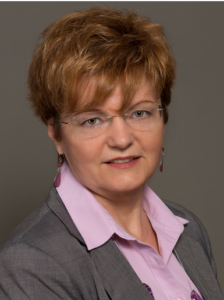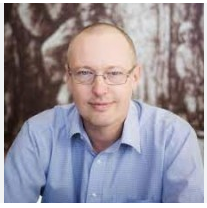Invited speaker: doc. Dr. Turcsányi-Szabó Márta, PhD.
Department of Media and Educational Informatics of Faculty of Informatics,
Eötvös Loránd University in Budapest, Hungary
 Márta Turcsányi-Szabó – associate professor at the Department of Media and Educational Informatics of Faculty of Informatics Eötvös Loránd University (FI ELTE) in Budapest. She studied at ELTE and the American University in Cairo. She obtained his PhD degree in 1999 in the field of mathematics and computer science and Dr.hab. degree in 2023 at the FI ELTE. She is lecturer of the Doctoral School of Education at ELTE, supervisor of the Doctoral School of Informatics. Number of doctoral students under her supervision is 11. Thanks to his work, the ICT-themed lessons of the general teacher training programs at ELTE have been renewed. He founded the T@T lab, the purpose of which is to create an experience-oriented model employment research center equipped with innovative tools, where learning-promoting technology environments are created by combining 21st century ICT tools and appropriate pedagogical methods. The center provides space for research, development, testing and evaluation of prototypes, implementing the results in teacher training, popularizing and disseminating them more widely. He is a member of the editorial board of several scientific journals. He participated in several successful international and domestic tenders. The greatest international success she achieved in 2014, when IELA, the International eLearning Society, chose the pedagogical project “Preparing for Smart Learning” as the best of the learning projects supported by mobile devices. She performed and performs many academic functions and held and holds high positions at ELTE. She is the holder of many foreign and domestic awards, honors and recognitions.
Márta Turcsányi-Szabó – associate professor at the Department of Media and Educational Informatics of Faculty of Informatics Eötvös Loránd University (FI ELTE) in Budapest. She studied at ELTE and the American University in Cairo. She obtained his PhD degree in 1999 in the field of mathematics and computer science and Dr.hab. degree in 2023 at the FI ELTE. She is lecturer of the Doctoral School of Education at ELTE, supervisor of the Doctoral School of Informatics. Number of doctoral students under her supervision is 11. Thanks to his work, the ICT-themed lessons of the general teacher training programs at ELTE have been renewed. He founded the T@T lab, the purpose of which is to create an experience-oriented model employment research center equipped with innovative tools, where learning-promoting technology environments are created by combining 21st century ICT tools and appropriate pedagogical methods. The center provides space for research, development, testing and evaluation of prototypes, implementing the results in teacher training, popularizing and disseminating them more widely. He is a member of the editorial board of several scientific journals. He participated in several successful international and domestic tenders. The greatest international success she achieved in 2014, when IELA, the International eLearning Society, chose the pedagogical project “Preparing for Smart Learning” as the best of the learning projects supported by mobile devices. She performed and performs many academic functions and held and holds high positions at ELTE. She is the holder of many foreign and domestic awards, honors and recognitions.
Topic:
Enjoyable learning for everyone!
Élményalapú tanulás mindenkinek! Zážitkové učenie pre každého!
Author: doc. Dr. Turcsányi-Szabó Márta, PhD.
Department of Media and Educational Informatics of Faculty of Informatics,
Eötvös Loránd University in Budapest, Hungary
Date, time and place of the lecture:
XXXVII. DidMatTech 2024 – International Conference
Wednesday, 9th of October, 2024 11:30 – 13:15 in Plenary Session.
Invited speaker: RNDr. Ján Skalka, PhD.
Faculty of Natural Sciences and Informatics,
Constantine the Philosopher University in Nitra, Slovakia
 Ján Skalka – head of Department of Informatics FNS&I. Received a master’s degree in mathematics and informatics education from the Department of Informatics, Constantine the Philosopher University in Nitra, Slovakia. He defended the Ph.D. thesis in the research study program of technology of education from the Constantine the Philosopher University in Nitra in 2004. Since 2000, he has been an assistant professor and an associate professor at the Faculty of Natural Sciences and Informatics, Constantine the Philosopher University in Nitra. He is currently a member of the Knowledge Discovery Research Group. He is the author of many textbooks. He has recently dealt with the support of electronic education in the form of microlearning. His research interests include information systems implementation and integration, blended learning and e-learning applications in education, programming learning and teaching, and developing applications to support education.
Ján Skalka – head of Department of Informatics FNS&I. Received a master’s degree in mathematics and informatics education from the Department of Informatics, Constantine the Philosopher University in Nitra, Slovakia. He defended the Ph.D. thesis in the research study program of technology of education from the Constantine the Philosopher University in Nitra in 2004. Since 2000, he has been an assistant professor and an associate professor at the Faculty of Natural Sciences and Informatics, Constantine the Philosopher University in Nitra. He is currently a member of the Knowledge Discovery Research Group. He is the author of many textbooks. He has recently dealt with the support of electronic education in the form of microlearning. His research interests include information systems implementation and integration, blended learning and e-learning applications in education, programming learning and teaching, and developing applications to support education.
Topic:
Virtual Learning Environment for Programming Learning
Virtuális tanulási környezet programozás tanuláshoz; Virtuálne vzdelávacie prostredie pre učenie programovania
Author: RNDr. Ján Skalka, PhD.
Faculty of Natural Sciences and Informatics,
Constantine the Philosopher University in Nitra, Slovakia
The ability to prepare algorithms to solve problems and rewrite them into program codes is one of the necessary skills for finding work in the IT sector. Although pupils have been developing algorithmic skills since the first years of primary school, many fail to establish it to write programs. In higher education programming, language courses are still the most challenging courses for which students fail. The current approach to solving this problem is based on adapting the educational methodology to the habits of current students. The approach used to obtain information for young Generation Z programmers is based primarily on using smartphones, the limited amount of information displayed, and providing immediate feedback. An ideal tool for teaching programming at universities, which can eliminate some beginner’s difficulties when set up correctly, is automated assessment supported by microlearning lessons and the possibility of using generative AI to explain frequently repeated questions. The lecture aims to present the possibilities currently offered by virtual educational environments and to share experiences with their use.
Date, time and place of the lecture:
XXXVII. DidMatTech 2024 – International Conference
Wednesday, 9th of October, 2024 11:30 – 13:15 in Plenary Session